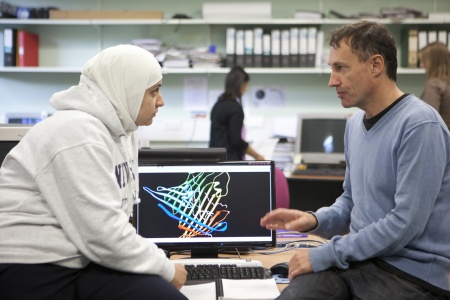
November 22, 2017, by Sophie Berckhan
The Internet of Simulations
The Digital Research Team is working with Charlie Laughton in the School of Pharmacy to explore if computational simulations could be done differently.
In many fields, computational methods are used to generate a prediction as to how a system will behave over time. Typically the simulation is a small window in time into what is, in the real word, something which lasts much longer. Examples would be the flow of air over an aircraft wing, or the binding of a drug molecule to a protein. In such cases there is no logical ‘start’ or ‘end’ to the simulation, and yet current computational methods require that we think in this way: we start the simulation, collect the data, then stop it. One can contrast this with field-based observation in the biological sciences, where an observer collects a sample of data, over a time window, from an environment that was ‘doing it’s thing’ long before the observer turned up, and will continue to do so for long after they have left. Observers can return to the field as and when they need to, and multiple observers may be present, each extracting from the environment a different sort of data.
Could simulations be done differently?
Using ideas from the Internet of Things, The Internet of Simulations is a project to re-imagine simulation science as a type of field work. Simulations of, for example, proteins and drug molecules become autonomous agents that have an existence independent of any observer. They are long-lived, streaming web applications that can be monitored from a distance. Data streams may be shared, lowering barriers to collaboration, or even Open Access, allowing public science. By separating the process of maintaining the simulation from the process of collecting and analysing the data, interesting new models (and interesting issues!) for the prosecution of simulation science are enabled.
How could you get involved?
A computational framework has been prototyped to support this research. However it is classic prototype research code, not yet of a standard to be made available to the community – a vital step towards impact. Support from Research Software Engineer is vital for this: We have funding available from the Digital Initiative Fund to support this activity. The perfect candidate would be someone who has first-hand experience of developing and delivering a streaming web application – e.g. BBC iPlayer or Hive. We need an expert on distributed server/client systems, data resilience and security, web-based interfaces, quality user interfaces, etc. Most pressingly, while the initial release of the (python-based) Tios client software is just about ready (just “pip install”), the server side is much more complex to package for “one click” installation and configuration.
In addition there would appear to be great possibilities to increase impact by broadening the scope of the project to other fields of computational simulation, for example simulations in Social Science.
If you would like to get involved, please contact Sophie Berckhan (sophie.berckhan@nottingham.ac.uk).
No comments yet, fill out a comment to be the first

Leave a Reply